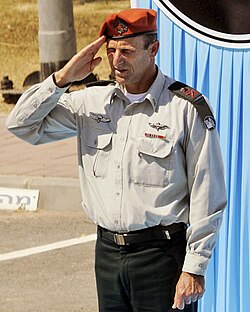Eyal Eisenberg
| Eyal Eizenberg | |
|---|---|
 |
|
| Native name | איל איזנברג |
| Born | 1963 (age 53–54) Kfar Bialik, Israel |
| Allegiance |
|
| Service/branch |
|
| Years of service | 1981– |
| Rank | Aluf (Major General) (res.) |
| Commands held | Gaza Division, Home Front Command |
| Battles/wars | 1982-2000 South Lebanon conflict, Second Intifada (Operation Days of Penitence, Operation Rainbow), 2006 Lebanon War, 2008–2009 Israel–Gaza conflict |
Aluf Eyal Eizenberg (Hebrew: איל איזנברג) (born 1963) is a former general in the Israel Defense Forces; his last position was the head of IDF Home Front Command. He led the Israel Defense Forces (IDF) Gaza Division during the 2008–2009 Israel–Gaza conflict.
Eizenberg was born in Kfar Bialik in 1963. He began his military service in the Israel Defense Forces in 1981, as a cadet in the Israel Air Force (IAF) Flight School. He did not complete his pilot training, and moved to the Air Force's Shaldag commando unit, where he became a company commander. He then joined the Givati Brigade as commander of the Brigade's Samson's Foxes Reconnaissance company, and later as the commander of its Shaked battalion. He returned to the Shaldag Unit as its commander, a post he held from 1996- 1999. He was promoted to the rank of Colonel, and commanded the Eastern Brigade of Lebanon Liaison Unit during Israel's withdrawal from the security zone it held in Lebanon in 2000. Subsequently he commanded a reserve paratrooper brigade, before returning to Givati Brigade as its commander, in 2003-2005. He led the brigade during Operation Days of Penitence, and according to Human Rights Watch, he was one of the key Israeli decision-makers in the Gaza Strip during Operation Rainbow in May 2004. In November 2005 he assumed command of the 98th Paratroopers Division, and led it during the 2006 Lebanon War. Though the performance of his division in the war was criticized by the Winograd Commission, he was the only one of the four divisional commanders that participated in the war who continued to serve in the army after the war, advancing in the ranks. His appointment as commander of the Gaza Division was harshly criticized, due to the perceived failure of the division under his command in the Lebanon war.
...
Wikipedia
